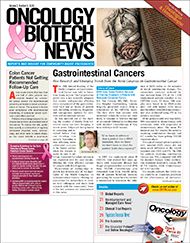Sorafenib (Nexavar) Is Effective and Well Tolerated in Asian Patients with Advanced Hepatocellular Carcinoma
In an oral presentation, Ann-Lii Cheng, MD, PhD, National Taiwan University Hospital, Taipei, Taiwan, highlighted the results of a phase III study evaluating the efficacy and safety of sorafenib in patients from the Asia-Pacific region with advanced hepatocellular carcinoma (HCC).
Click here to view as PDF.
Clinical Trial Reports from ASCO
Noncolorectal Gastrointestinal Cancers
In an oral presentation, Ann-Lii Cheng, MD, PhD, National Taiwan University Hospital, Taipei, Taiwan, highlighted the results of a phase III study evaluating the efficacy and safety of sorafenib in patients from the Asia-Pacific region with advanced hepatocellular carcinoma (HCC).
Patients with advanced, measurable HCC, ECOG PS 0-2, Child-Pugh status A, no prior systemic therapy for HCC, and life expectancy >12 weeks were randomized 2:1 to sorafenib 400 mg bid or placebo (Figure). Endpoints included overall survival (OS), time to progression (TTP), time to symptomatic progression (FSHI8-TSP), disease control rate (DCR; defined as complete or partial response or stable disease according to RECIST, maintained for >28 days from first demonstration) and safety.
A total of 226 patients were randomized. Baseline demographic and disease characteristics were similar between the sorafenib (n=150) and placebo (n=76) groups.
P
P
P
P
Median OS in the sorafenib and placebo groups, respectively, was 6.2 and 4.1 months ( = .0155). Median TTP was 2.8 and 1.4 months, respectively ( = .0007), median PFS was 2.8 and 1.4 months, respectively ( = .0009), median FSHI8-TSP was 3.5 versus 3.4 months, respect ively ( = .4458). The DCR was 35% and 16% in the two groups, respectively.
The most frequently reported >grade 3 drug-related adverse events (sorafenib vs placebo) were hand— foot skin reaction (10.1 vs 0.0%), diarrhea (6.0 vs 0.0%), hyperbilirubinemia (3.4 vs 2.7%), and fatigue (3.4 vs 1.3%). Drug-related serious adverse events were observed in 13 (9%) patients in the sorafenib group and in 1 patient in the placebo group.
Compared with placebo, sorafenib significantly prolonged OS and TTP in patients from the Asia- Pacific region with advanced HCC and was well tolerated.
Dr. Cheng stated that “sorafenib demonstrated a clear survival benefit in Asia-Pacific patients and had comparable results to last year’s SHARP (Sorafenib Hepatocellular Carcinoma Assessment Randomized Protocol) trial, despite these patients in the Asia-Pacific trial having poorer health status and more metastases.”
Results from the SHARP trial, which was conducted in 602 patients, were presented at last year’s ASCO meeting. The SHARP study showed a 44% improvement in OS with sorafenib, with a median OS of 10.7 months for sorafenib and 7.9 months for placebo. It also showed a 73% prolongation of TTP with sorafenib, with a median TTP of 24 weeks for sorafenib and 12 weeks for placebo. The trial was stopped early because of the strongly positive results.
Collectively, the results of the two trials confirm the survival advantage conferred by sorafenib and demonstrate its applicability in a broad range of patients with advanced HCC.
